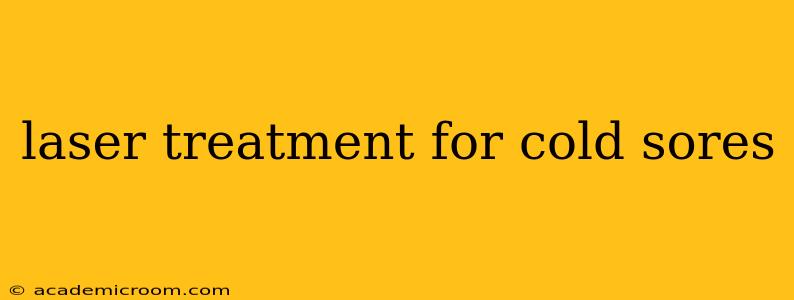Cold sores, also known as fever blisters or oral herpes, are a common viral infection caused by the herpes simplex virus (HSV). While typically resolving on their own within a week or two, their unsightly appearance and discomfort can be significantly disruptive. Laser treatment offers a potential solution for faster healing and symptom relief, but it's crucial to understand its efficacy, limitations, and potential side effects.
What is Laser Treatment for Cold Sores?
Laser therapy for cold sores uses targeted light energy to treat the affected area. Different types of lasers exist, each with its own mechanism of action. The most commonly used lasers for cold sores include:
- Low-level laser therapy (LLLT): This type of laser uses low-intensity light to stimulate cell regeneration and reduce inflammation. It aims to accelerate the healing process and reduce pain and discomfort.
- Pulsed dye laser: This laser targets blood vessels, reducing swelling and inflammation, thus potentially shortening the duration of a cold sore outbreak.
The procedure is typically quick, painless, and requires minimal downtime. The exact number of treatments and their frequency will depend on the severity of the cold sore and the type of laser used. It's important to note that laser treatment doesn't cure the HSV infection; it manages the symptoms of an outbreak.
Does Laser Treatment for Cold Sores Really Work?
While research is still ongoing, anecdotal evidence and some studies suggest laser therapy can effectively reduce the duration and severity of cold sore outbreaks. LLLT, in particular, shows promise in promoting faster healing and reducing pain. However, the effectiveness can vary depending on the individual, the severity of the infection, and the type of laser used. It's crucial to consult a dermatologist or healthcare professional to determine if laser therapy is appropriate for you.
How Long Does it Take for Laser Treatment to Work?
The timeframe for improvement varies, but many patients report a noticeable reduction in symptoms within a few days of treatment. Complete healing may take several days to a week, depending on the severity of the cold sore and the individual's response to treatment. It's essential to follow the dermatologist's aftercare instructions to maximize the benefits of the treatment and prevent complications.
What are the Side Effects of Laser Treatment for Cold Sores?
Laser treatment for cold sores is generally considered safe, but potential side effects can include:
- Temporary redness or swelling: This is common and usually resolves within a few hours or days.
- Slight discomfort or burning sensation: This can be minimized with appropriate anesthetic techniques.
- Scarring: Extremely rare, particularly with low-level lasers, and usually only occurs with improper technique.
It's crucial to choose a qualified and experienced dermatologist to minimize the risk of complications. They'll assess your individual needs and ensure the treatment is performed correctly.
Is Laser Treatment for Cold Sores Expensive?
The cost of laser treatment for cold sores varies depending on factors such as the type of laser used, the number of sessions required, and the location of the clinic. It's advisable to contact your chosen clinic to get a specific price quote. It's also important to discuss the cost with your insurance provider, as some plans may cover a portion of the expenses.
Are there any Alternatives to Laser Treatment for Cold Sores?
Yes, several other treatments are available for cold sores, including:
- Over-the-counter creams and ointments: These can help reduce pain, promote healing, and shorten the duration of the outbreak.
- Prescription antiviral medications: These medications can reduce the frequency and severity of outbreaks.
- Home remedies: These include applying ice packs, using lip balm with sunscreen, and avoiding triggers like stress and sun exposure.
Conclusion
Laser treatment offers a promising approach to managing cold sores, potentially offering faster healing and reduced symptoms. However, it's not a cure for the HSV infection. Consult with a dermatologist or healthcare professional to determine if laser therapy is suitable for you and to discuss potential risks and benefits. Remember to explore all available treatment options and choose the approach that best suits your individual needs and preferences. Remember to always consult a healthcare professional before starting any new treatment.
